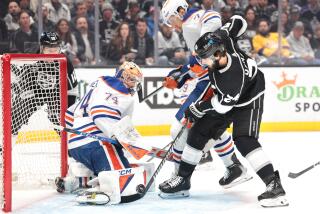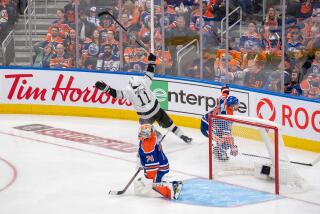Kings Look for Inner Strength
- Share via
Karl Malone’s combination of strength and grace is hard to match for other forwards. Chris Webber has a large measure of Malone’s skill, but he knows he isn’t as strong.
“He’s the strongest guy for his height that I’ve ever played,” Webber said. “I’ve got the bruises and the loose teeth to prove it.”
The Sacramento Kings’ star forward hopes to emulate a different kind of strength in the next few weeks -- the inner strength with which Malone and John Stockton have led the Utah Jazz on its sustained run of excellence.
Back when Malone was Webber’s age, the Jazz finally began to make progress in its quest to reach the NBA Finals. Now it’s Webber’s turn to lead the Kings on that quest -- and their first obstacle is Malone and Stockton, who might be in the final days of their amazing careers together.
“That’s a determined team that’s been through the battles,” Webber said. “They had a lot of frustration early in their careers. Golden State swept them out of the first round one year. Karl and John just kept coming back every year, never giving an inch. That’s the kind of determination that we need to aspire to.”
The Pacific Division champion Kings are heavy favorites in the best-of-seven playoff series starting tonight at Arco Arena. They’ve won seven of the teams’ last eight regular-season meetings, and lost only once to Utah in the first round last spring.
But Webber and his teammates know more NBA history than the average team. Most are basketball junkies. Bobby Jackson and Gerald Wallace have worn deliberately obscure throwback jerseys -- Gar Heard and former Jazz forward Truck Robinson, for example -- into the locker room to spark conversation.
Webber and fellow veteran Vlade Divac reminded their teammates that NBA championship runs usually don’t happen without years of failure -- and first-round upsets happen all the time.
“We’re a better team, obviously, but sometimes the better team doesn’t always win,” Divac said. “It happened to us last year. I’d be surprised if we’re not in the second round, but we’re not taking it for granted.”
Following a regular season-ending loss in Sacramento, the Jazz returned to Salt Lake City for two days of practice. In a 20th straight trip to the playoffs, the Jazz’s strategy will be much the same as the previous 19 game plans: control the tempo, play gritty defense and dare opponents to stop its offense.
Though the Kings have dominated the rivalry in recent years, the teams have a history of close games. The Jazz usually is successful in forcing the Kings to play at the deliberate tempo Utah prefers.
“If we can execute with them and make them play our style of ball, we have as good a shot as them,” Malone said. “We don’t want to get into a track meet with them. We’ve got to make them play defense for a long period of time.”
Utah’s consistency has always been its greatest asset. No matter the changing cast around Malone and Stockton, the Jazz has won with the pick-and-roll, the hard foul, the sneakily effective fast break -- all the values preached by Coach Jerry Sloan.
“You stay with it, no matter what they do on you defensively,” Stockton said. “You insist on running the offense, and hopefully make the shots.”
*
Phoenix beat San Antonio three out of four times this season thanks to Stephon Marbury.
In the four games, Marbury averaged 32.5 points, nine assists and five rebounds -- all above his season marks -- while mostly being defended by Tony Parker, the Spurs’ 20-year-old point guard.
The eighth-seeded Suns hope for the same success in their playoff series against the top-seeded Spurs. Game 1 is today at San Antonio.
“He’s just relentless on getting to the basket,” Phoenix guard Penny Hardaway said of Marbury. “When you have someone like that that can draw all the attention, all we have to do is knock down those wide-open shots that we get, and that makes it tougher for them to guard him.”
Parker, in his second NBA season, knows the pressure will be on him to stop the bigger and stronger Marbury.
“Obviously I have to play better defense,” Parker said. “You can slow him down but you can’t stop him.”
Spur Coach Gregg Popovich said everyone must play better defense, especially against Marbury, Shawn Marion and Joe Johnson.
“They have very, very good and accurate pass-catch-shoot players,” Popovich said. “When they have those guys on the court, we have to find them and guard them, and we haven’t done a good job of that.”
Even though they had problems with Phoenix this season, Marbury doesn’t expect the Spurs to change their plan.
That means getting the ball to Tim Duncan, who also put up big numbers in the four Suns-Spurs contests despite steady double-teaming: 30-plus points three times, along with an average 14.5 rebounds and seven assists.
*
Dallas’ Michael Finley and Portland’s Scottie Pippen returned from injuries just in time for the playoffs. The one who returns to form first could determine which team will advance when the series opens tonight at Dallas.
Dallas went 7-6 while Finley recovered from a strained hamstring, ending a season-long stay atop the NBA and dropping to the third seed.
Portland went from an early season funk to a 38-16 roll after Pippen took over at point guard. Then a knee injury knocked him out and the Blazers went 8-9. They missed a shot at the fourth seed, which would have given them home-court advantage in the first round, and dropped all the way to sixth.
Finley and Pippen played the final two games and neither was very sharp.
Rest, practice and the incentive of the playoffs should bring out whatever they can muster when the series begins.
On Friday, they gave opposite status reports.
Finley was optimistic, saying there’s no pain and that he’s so happy to be back that he feels “like a rookie again.”
Pippen sounded pessimistic, fearing that he might even be an obstacle.
“I’m real cautious right now that I don’t hurt my team,” he said. “I have to make sure I’m a positive for us.”
Their roles are as different as their attitudes.
Yet, as their absences proved, each is pivotal.
More to Read
Go beyond the scoreboard
Get the latest on L.A.'s teams in the daily Sports Report newsletter.
You may occasionally receive promotional content from the Los Angeles Times.






